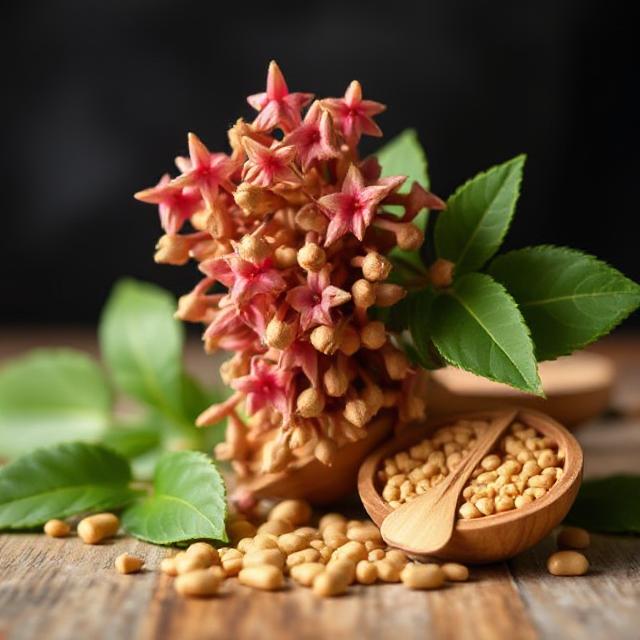Introduction
In the whirlwind of modern life, stress has become more than a passing nuisance—it’s practically a constant companion. With jam-packed workdays, personal obligations, and endless digital noise, it’s no wonder so many of us feel burnt out and on edge. Sure, there are plenty of coping tools out there, but sometimes the most enduring solutions are the oldest. Enter Ashwagandha (Withania somnifera)—an ancient herb making a major comeback in the wellness world. Steeped in Ayurvedic tradition, this powerful adaptogen has long been revered for its ability to strengthen the body, calm the mind, and help us adapt to stress naturally. In this guide, we’ll explore what makes Ashwagandha so special—from its history and scientific validation to the many ways it can enhance your physical and mental health.

What is Ashwagandha?
Ashwagandha, also called Indian Ginseng or Winter Cherry, is a potent adaptogenic herb that’s been a staple in Ayurvedic medicine for over 3,000 years. The term “Ashwagandha” comes from Sanskrit: ashva meaning “horse” and gandha meaning “smell,” symbolizing the herb’s strength-enhancing properties and its earthy, horse-like aroma.
Traditionally used to boost stamina, support the immune system, and reduce pain and inflammation, Ashwagandha’s real magic lies in its ability to help the body adapt to stress—whether it’s physical, mental, or environmental. Classified as an adaptogen, it works by balancing bodily functions under pressure. Its roots contain withanolides, powerful bioactive compounds believed to be behind its calming, anti-inflammatory, and antioxidant effects.
The Science Behind Ashwagandha’s Stress-Soothing Power
Modern science is catching up to what ancient healers already knew: Ashwagandha works. Researchers have uncovered how it supports stress resilience by influencing the hypothalamic-pituitary-adrenal (HPA) axis, the body’s central stress response system. When life throws curveballs, the HPA axis ramps up cortisol—the body’s primary stress hormone. While useful short-term, chronic cortisol spikes wreak havoc over time, affecting immunity, metabolism, and brain health.
Ashwagandha steps in to balance cortisol levels, preventing them from staying elevated for too long. This helps reduce anxiety, ease tension, and support mental clarity.
But that’s not all—it’s also a potent antioxidant, shielding your cells from the damage caused by oxidative stress. Those same withanolides that balance cortisol also neutralize free radicals, protecting your body at the cellular level.
Ashwagandha is also believed to enhance GABA (gamma-aminobutyric acid) activity in the brain, a neurotransmitter known for its calming effects. By calming an overactive nervous system, it encourages relaxation, reduces anxiety, and fosters better emotional balance. In short: this herb tackles stress from multiple angles—hormonal, neurological, and cellular.

The Many Benefits of Ashwagandha
Ashwagandha’s reputation as a stress-buster is well-earned, but its benefits reach far beyond calming your nerves. Let’s break it down:
1. Reduces Stress and Anxiety
Clinical trials have consistently shown that Ashwagandha can lower perceived stress and reduce symptoms of anxiety. By calming the HPA axis and enhancing neurotransmitter balance, it helps you feel more grounded, relaxed, and emotionally stable.
2. Improves Sleep Quality
Chronic stress often hijacks sleep, leaving you tossing and turning. Ashwagandha’s calming influence not only helps you fall asleep faster, but also deepens sleep, promoting a more restful night and better next-day energy.
3. Boosts Physical Performance
It’s not just a mental game—Ashwagandha has been shown to increase strength, endurance, and VO2 max. It also supports muscle recovery, making it a favorite among athletes looking for natural performance support.
4. Enhances Brain Function
Want a cognitive edge? Studies suggest Ashwagandha may improve memory, focus, and mental clarity. Its neuroprotective and antioxidant properties help preserve brain cells and support healthy neural function.
5. Supports Male Fertility and Hormones
Ashwagandha has demonstrated positive effects on testosterone levels, sperm quality, and male fertility—particularly in men dealing with stress-induced hormonal imbalances.
6. Fights Inflammation and Oxidative Damage
Thanks to its rich concentration of withanolides, Ashwagandha offers anti-inflammatory and antioxidant protection, helping to combat systemic inflammation and reduce the risk of chronic diseases.
7. May Help Regulate Blood Sugar
Preliminary studies indicate that Ashwagandha may help lower blood sugar and improve insulin sensitivity, positioning it as a potential complementary option for blood sugar management.
How to Use Ashwagandha
Ashwagandha comes in many forms—powders, capsules, and tinctures—with root extract being the most widely used and studied. Look for standardized extracts with high withanolide content for maximum efficacy.
Typical dosage ranges from 250–500 mg per day, but some studies support higher amounts (up to 1000 mg) for specific concerns. Always follow label directions and, if in doubt, consult a healthcare provider.
Some prefer taking it in the evening to promote sleep, while others take it in the morning to manage daytime stress. Either works—consistency is key. You’ll likely begin noticing benefits within a few weeks.
Potential Side Effects & Precautions
While generally safe, Ashwagandha isn’t for everyone. Here are some things to watch for:
- Digestive Issues: Nausea, upset stomach, or diarrhea may occur, especially with high doses.
- Drowsiness: Its relaxing effects may cause sleepiness in some users.
- Headaches: Rare, but possible.
- Liver Health: Though uncommon, there are isolated reports of liver issues. People with liver conditions should be cautious.
- Thyroid Function: Ashwagandha can boost thyroid hormones—those with hyperthyroidism should consult a doctor.
- Pregnancy & Breastfeeding: Avoid due to limited safety data.
- Autoimmune Conditions: May stimulate immune activity—talk to your provider if you have conditions like lupus or rheumatoid arthritis.
Pro Tip: Buy from reputable brands that test for purity and potency, and stick to recommended dosages.
Conclusion
Ashwagandha isn’t just a trendy supplement—it’s a time-tested herbal ally with real, measurable benefits. Whether you’re battling chronic stress, struggling with sleep, aiming to sharpen your mind, or simply seeking a more balanced life, Ashwagandha has something to offer. Its ability to regulate stress hormones, support brain health, enhance performance, and protect your cells makes it a holistic powerhouse in the world of natural wellness.
By incorporating Ashwagandha into your daily routine—with awareness and consistency—you can unlock its full potential and experience life with more energy, calm, and clarity.
Welcome this ancient herb into your modern life—and let Ashwagandha guide you back to balance.